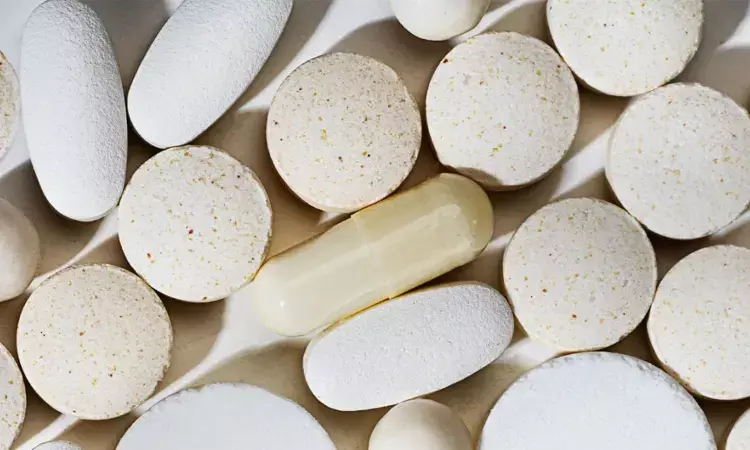- Home
- Medical news & Guidelines
- Anesthesiology
- Cardiology and CTVS
- Critical Care
- Dentistry
- Dermatology
- Diabetes and Endocrinology
- ENT
- Gastroenterology
- Medicine
- Nephrology
- Neurology
- Obstretics-Gynaecology
- Oncology
- Ophthalmology
- Orthopaedics
- Pediatrics-Neonatology
- Psychiatry
- Pulmonology
- Radiology
- Surgery
- Urology
- Laboratory Medicine
- Diet
- Nursing
- Paramedical
- Physiotherapy
- Health news
- Fact Check
- Bone Health Fact Check
- Brain Health Fact Check
- Cancer Related Fact Check
- Child Care Fact Check
- Dental and oral health fact check
- Diabetes and metabolic health fact check
- Diet and Nutrition Fact Check
- Eye and ENT Care Fact Check
- Fitness fact check
- Gut health fact check
- Heart health fact check
- Kidney health fact check
- Medical education fact check
- Men's health fact check
- Respiratory fact check
- Skin and hair care fact check
- Vaccine and Immunization fact check
- Women's health fact check
- AYUSH
- State News
- Andaman and Nicobar Islands
- Andhra Pradesh
- Arunachal Pradesh
- Assam
- Bihar
- Chandigarh
- Chattisgarh
- Dadra and Nagar Haveli
- Daman and Diu
- Delhi
- Goa
- Gujarat
- Haryana
- Himachal Pradesh
- Jammu & Kashmir
- Jharkhand
- Karnataka
- Kerala
- Ladakh
- Lakshadweep
- Madhya Pradesh
- Maharashtra
- Manipur
- Meghalaya
- Mizoram
- Nagaland
- Odisha
- Puducherry
- Punjab
- Rajasthan
- Sikkim
- Tamil Nadu
- Telangana
- Tripura
- Uttar Pradesh
- Uttrakhand
- West Bengal
- Medical Education
- Industry
Magnesium supplementation significantly increases HDL-cholesterol among people with prediabetes

Iran: In people with prediabetes, oral magnesium supplementation increases HDL-cholesterol levels, a recent study in Scientific Reports has shown. HDL-cholesterol is considered a significant cardiometabolic factor for preventing cardiovascular disease (CVD) in prediabetics who are at higher risk of CVD in the future.
The study further stated that supplementation with magnesium oxide at 250 mg/day did not improve cardiometabolic markers.
Lifestyle and human behavior nowadays have profoundly changed. People are overeating, living longer, and inactive, increasing the rates of type 2 diabetes mellitus (T2DM) and obesity. T2DM is considered a global burden and is the leading cause of blindness, kidney failure, and nontraumatic leg amputations, as well as the foremost cause of heart attacks and strokes.
Prediabetes is the first stage of type 2 diabetes in which blood sugar levels are higher than usual but not yet at the level of diabetes. Early detection and effective treatment of prediabetes can change the natural history of diabetes and delay or prevent complications. Magnesium plays a critical role in many different biochemical reactions. It helps maintain various vital functions, including neuromuscular conduction, glucose regulation, myocardial electrical activity, muscle contraction, and blood pressure.
Against the above background, Rezvan Salehidoost, Isfahan University of Medical Sciences, Isfahan, Iran, and colleagues investigated magnesium's supplementation effect on insulin resistance and cardiovascular markers in prediabetes patients.
The researchers conducted a 12-week double-blind, placebo-controlled randomized clinical trial at Isfahan Endocrine and Metabolism Research Center, Iran. The study compared the effects of magnesium oxide 250 mg/day to a placebo in people with prediabetes (n = 86) on blood pressure, anthropometric indices, insulin, fasting glucose, C-reactive protein, HOMA-IR index, uric acid, and lipid profile. Both groups had comparable distributions of biochemical and anthropometric variables at baseline.
The study led to the following findings:
- Patients who received magnesium supplementation had significantly higher HDL-cholesterol levels versus the placebo group at the study's end (49.7 ± 10.9 vs. 43.6 ± 7.2 mg/dL).
- The mean changes in HOMA-IR index, LDL-cholesterol, total cholesterol, uric acid, triglyceride, C-reactive protein levels, blood pressure, and anthropometric indices in supplemented and placebo groups did not vary remarkably.
Findings from the randomized controlled trial (RCT) involving prediabetes patients showed that magnesium supplementation of 250 mg daily for 12 weeks increased HDL-cholesterol. However, the supplementation did not impact insulin and fasting plasma glucose levels, HOMA-IR index, and HbA1c, as well as the levels of uric acid and CRP.
"Considering possible limitations concerning magnesium formulation, limited sample size, and duration of therapy, one should be cautious before drawing any definitive conclusions," the researchers wrote in their study. "Then, further studies using different magnesium doses and extended intervention periods would be the next step for assessing the effects of magnesium on cardiometabolic markers."
Reference:
Salehidoost, R., Taghipour Boroujeni, G., Feizi, A. et al. Effect of oral magnesium supplement on cardiometabolic markers in people with prediabetes: a double blind randomized controlled clinical trial. Sci Rep 12, 18209 (2022). https://doi.org/10.1038/s41598-022-20277-6
Dr Kartikeya Kohli is an Internal Medicine Consultant at Sitaram Bhartia Hospital in Delhi with super speciality training in Nephrology. He has worked with various eminent hospitals like Indraprastha Apollo Hospital, Sir Gangaram Hospital. He holds an MBBS from Kasturba Medical College Manipal, DNB Internal Medicine, Post Graduate Diploma in Clinical Research and Business Development, Fellow DNB Nephrology, MRCP and ECFMG Certification. He has been closely associated with India Medical Association South Delhi Branch and Delhi Medical Association and has been organising continuing medical education programs on their behalf from time to time. Further he has been contributing medical articles for their newsletters as well. He is also associated with electronic media and TV for conduction and presentation of health programs. He has been associated with Medical Dialogues for last 3 years and contributing articles on regular basis.
Dr Kamal Kant Kohli-MBBS, DTCD- a chest specialist with more than 30 years of practice and a flair for writing clinical articles, Dr Kamal Kant Kohli joined Medical Dialogues as a Chief Editor of Medical News. Besides writing articles, as an editor, he proofreads and verifies all the medical content published on Medical Dialogues including those coming from journals, studies,medical conferences,guidelines etc. Email: drkohli@medicaldialogues.in. Contact no. 011-43720751


